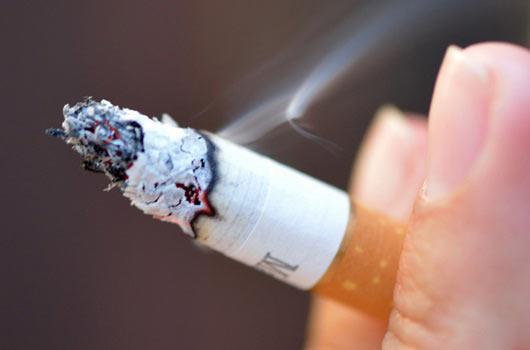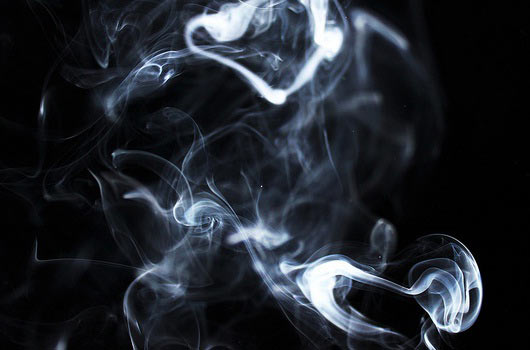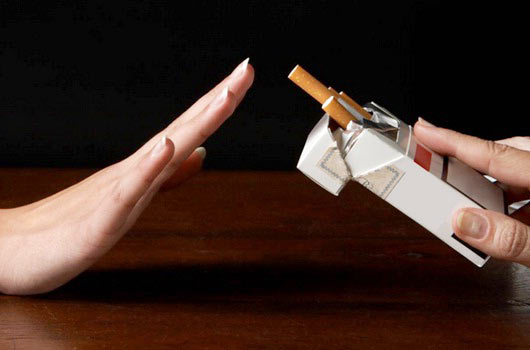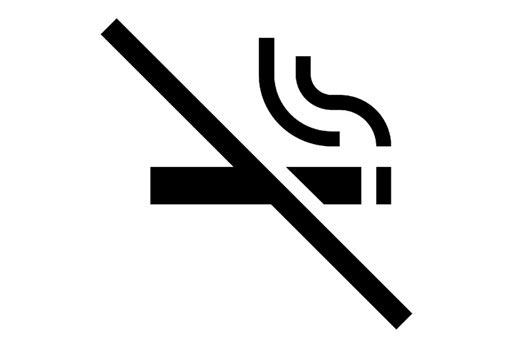Photographs: Courtesy Gud2Eat.com Courtesy Gud2Eat.com
Since it's No Tobacco Day today, here's some added incentive to help you kick the butt.
Did you know that nicotine from cigarettes is as addictive as heroin? Or that the alveoli in your lungs are permanently destroyed by smoking?
In the following pages, we bring you a variety of health issues brought on by the habit.
How smoking affects your brain
Nicotine from cigarettes is as addictive as heroin. It is tough to fight nicotine addiction, as the brain develops extra nicotine receptors to accommodate the large doses of nicotine from tobacco.
Initially when you quit smoking, the brain stops getting the nicotine it's used to and you start feeling anxious, irritable and have strong cravings for it.
Quitting smoking helps break the cycle of addiction and the large number of nicotine receptors in your brain will return to normal levels after about a month of having quit.
How smoking affects your lungs
Smoking causes inflammation in the small airways and tissues of your lungs, leading to shortness of breath, your chest feeling tight or causing you to wheeze.
Continued inflammation in the lungs builds up scar tissue, which leads to physical changes to your lungs and airways that can make breathing hard.
You may suffer from chronic cough and mucus if your lungs are affected for years.
Scarring of the lungs is not reversible and before you inflict permanent damage on them, it is important to quit smoking.
Smoking and emphysema
Smoking destroys the tiny air sacs or alveoli in the lungs that allow oxygen exchange. Alveoli don't grow back and are permanently destroyed by smoking.
Emphysema develops when enough alveoli are destroyed and causes severe shortness of breath, which can lead to death.
Note that there is no cure for emphysema, but quitting smoking early, before you have inflicted years of damage to the delicate air sacs in your lungs, will help protect you from developing emphysema.
Your brain, lungs, sex life: How smoking RUINS your health
Photographs: Courtesy Gud2Eat.com
Smoking and respiratory infections
Smokers get more colds and respiratory infections than non-smokers, as smoking temporarily paralyses and even kills cilia that are found in the airways, which help sweep out mucus and dirt so your lungs stay clear.
When you quit smoking, cilia start to re-grow and regain normal function very quickly, as they are one of the first things in your body to heal.
People sometimes cough more than usual when they first quit smoking and this is actually a sign that the cilia in their lungs are re-growing and working properly.
How smoking damages your heart
Smoking is one of the leading causes of heart attacks and heart disease -- many heart risks can be reversed simply by quitting smoking.
The nicotine in cigarettes stimulates your body to produce adrenaline, which makes your heart beat faster and raises your blood pressure, making your heart work harder.
Smoking tends to increase your blood pressure and puts stress on your heart, and over time makes it pump less blood to other parts of your body.
Carbon monoxide from inhaled cigarette smoke contributes to a lack of oxygen, making the heart work harder, thus increasing the risk of heart disease.
Quitting smoking helps lower your blood pressure and heart rate almost immediately;
Your risk of a heart attack starts declining within 24 hours of quitting.
How smoking affects arteries and blocks blood flow
Smoking increases the amount of cholesterol and unhealthy fats circulating in the blood, leading to unhealthy fatty deposits on the walls of your arteries. This fatty deposit build-up narrows the arteries and blocks normal blood flow to the heart, brain, and legs. Blockage in the blood vessels of your legs may result in the amputation of your toes or feet.
Quitting smoking will definitely not get rid of the fatty deposits that are already there, but will help lower the levels of cholesterol and fats circulating in your blood, which will help to slow the build-up of new fatty deposits in your arteries.
Your brain, lungs, sex life: How smoking RUINS your health
Photographs: Courtesy Gud2Eat.com
How smoking affects DNA
Your body is made up of cells that contain genetic material, or DNA, that is important for cell growth and function.
Every single puff of a cigarette causes damage to your DNA and when too many cells grow out of control, it leads to development of a cancer or tumour. Your body tries to repair the damage that smoking does to your DNA, but over time, smoking can wear down this repair system and lead to cancer.
Quitting smoking will prevent new DNA damage, plus can help repair the damage that has already been done, thus reducing your risk of getting cancer.
How smoking affects your immune system
Cigarette smoke contains high levels of chemicals and tar, which can make your immune system less effective at fighting off infections. A weak immune system makes you vulnerable over the years to autoimmune diseases like rheumatoid arthritis and multiple sclerosis.
Smoking also decreases your body's ability to fight off cancer.
Within the first few hours of quitting smoking, the elevated amount of nicotine and carbon monoxide in your system begins to return to normal. Within a month, your risk of infections decreases and three months after quitting, your body is able to repair itself much more efficiently than while you were smoking.
How smoking affects your white blood cells
Smokers have higher levels of white blood cells, or the blood cells that defend your body from infections. Basically this is a sign that the body is constantly fighting against inflammations and damage caused by tobacco.
In simpler words, a high white blood cell count is a signal from your body to let you know you've been injured.
When you quit smoking, your body will begin to heal from the damage caused by smoking and over time your white blood cell count will return to normal.
White blood cell counts that stay elevated for a long time are associated with an increased risk of heart attacks, strokes and cancer.
Your brain, lungs, sex life: How smoking RUINS your health
Photographs: Courtesy Gud2Eat.com
How smoking affects your sexual health
Smoking increases the risk of erectile dysfunction and the toxins from cigarette smoke can also damage the genetic material in sperm, which can cause infertility or genetic defects in your children.
Smoking lowers a female's level of estrogen. Low estrogen levels can cause dry skin, thinning hair, and memory problems. Women who smoke have a harder time getting pregnant and having a healthy baby. Smoking can also lead to early menopause.
Quit smoking to improve your chances of having a healthy sexual life
How smoking affects your bone health
Over time, smoking leads to a thinning of bone tissue and loss of bone density, causing the bones to become weak and brittle. Compared to non-smokers, smokers have a higher risk of bone fractures, and their broken bones take longer to heal.
Quitting smoking can reduce your risk of fractures, and lower your risk of developing osteoporosis.
Your brain, lungs, sex life: How smoking RUINS your health
Photographs: Courtesy Gud2Eat.com
How smoking affects muscles
When you smoke, less blood and oxygen flow to your muscles, making it harder to build muscle, plus the lack of oxygen tires your muscles easily. Smokers have more muscle aches and pains than non-smokers.
Quitting smoking will help increase the availability of oxygen in your blood, and your muscles will become stronger and healthier.
How smoking affects your eyes, ears and mouth
Smoking causes physical changes in the eyes that can threaten your eyesight, as nicotine from cigarettes restricts the production of a chemical necessary for you to be able to see at night. Smoking increases your risk of developing cataracts and macular degeneration.
Smoking reduces the oxygen supply to the cochlea, an organ in the inner ear and this may lead to permanent damage to the cochlea and mild to moderate hearing loss.
Quitting smoking will improve your night vision and keep your hearing sharp.
Research states that smokers have more oral health problems than non-smokers, like mouth sores, ulcers, gum disease and more cavities.
Smokers are also at a high risk of developing cancers of the mouth and throat.






Comment
article